Disclosure: Meeple Mountain received a free copy of this product in exchange for an honest, unbiased review. This review is not intended to be an endorsement.
A few years ago, WizKids published a game called Free Radicals. Inside that bright, shiny box (with what looked like a woman skateboarding on the cover, but on a more futuristic, Silver Surfer-like hoverboard with tech glasses that screamed “this is the future”), there were components for up to four players to compete against each other using different minigames.
In fact, the best part about Free Radicals was the promise, per the listing on the WizKids website, of “wildly asymmetric gameplay in an immersive, technologically evolved world.” In practice, there really are ten different ways to play and score points in Free Radicals. One player is doing their own pick-up-and-deliver game. Another one is using polyominoes to score, while another might be playing their own light deckbuilder. There’s a shared area where players can score points, but otherwise, everyone is on their own, right down to their own double-sided rulesheet that tells someone how to play their faction.
I’m drawn to games like Free Radicals. While some people gravitate towards titles such as Root (or, just keep playing Root expansions), I’m more a fan of games like Sidereal Confluence and Hegemony: Lead Your Class to Victory. I’d like to find lighter titles that fit the asymmetry bill, so when I did some investigation of the upcoming Off the Page Games title Grendel: The Game of Crime and Mayhem (currently available via crowdfunding), I was intrigued. Off the Page has done some great work, most notably Mind MGMT: The Psychic Espionage “Game” and Harrow County: The Game of Gothic Conflict.
Due to the timing of the campaign, Meeple Mountain had the chance to cover Grendel, so what follows are my thoughts on a single play with three players using version 1.3 of the living rules.
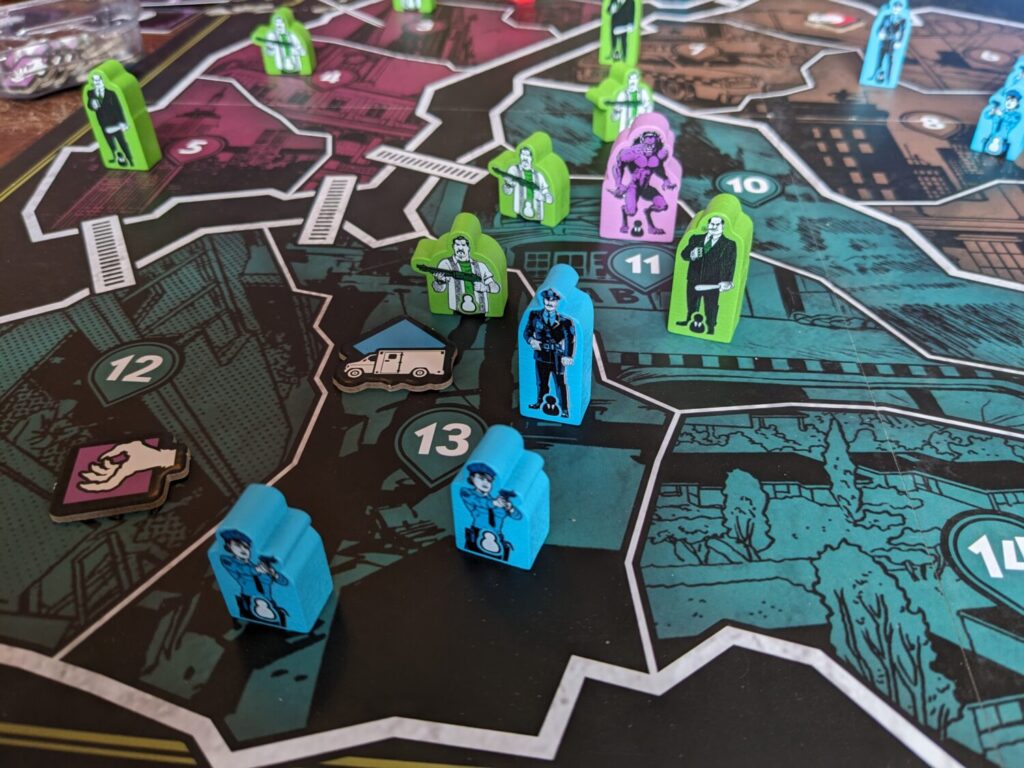
“I’ll Take Argent”
Grendel: The Game of Crime and Mayhem is an area control game for 2-4 players. Off the Page always builds their games off of existing graphic novel/comic book IP, and the art and the story behind Grendel is no exception. (They also seem to always place the word “game” in the titles of all of their games, presumably to not confuse fans of the graphic novels on which each game is based.)
Grendel is an older character, created by Matt Wagner (credited here as the writer and the artist of the board game) back in the early 1980s. In the comics, Grendel is the alter ego of Hunter Rose, an author living in New York City. Grendel is an assassin who takes on the Mob, the cops, and a hundreds-years-old man-wolf called Argent, who for my money is the best character in the board game.
Over a series of turns, each player takes actions using their own mini-game. The person operating the cops has a rondel, with two police car tokens triggering actions that help them spread the shield all over New York. The Mob player rolls dice to determine which actions they can take on a turn, many of which can quickly be upgraded to ensure grunts and mob captains continuously show up all over town. Argent uses a push-your-luck ruleset to draw cards and execute many actions on a single turn. Grendel’s game is a bag builder—by initially taking basic actions, the Grendel player can quickly build their bag of chits to become something that will trigger bonus actions on every turn.
I’ll give the game this much: it is easy to teach and it plays fast. The game’s map of New York has about 15 spaces spread across Manhattan, Queens and Brooklyn. During each player’s turn, they can drop influence tokens (known here as “aggression”) into a tower representing one of the three districts, as long as they have presence in that tower’s region. The towers are set up with counterweight tiles that collapse when a certain weight threshold has been met in that tower, depending on the player count. Lower aggression point totals weigh more than higher point totals, creating an interesting race for each player to try and score a particular region.
In my play, that meant that rounds sometimes triggered when one least expected it. When a tower triggers, all players get to take one turn in a “mayhem” phase, where they can make a few last-second moves to increase their influence in the borough being scored. Another thing I liked about this mechanic: each player gets to take a few actions, then they score for themselves only, meaning that the next player can then also make a couple moves before they score themselves. That gave everyone a chance to do something meaningful, even if they weren’t necessarily ready for a borough to score.
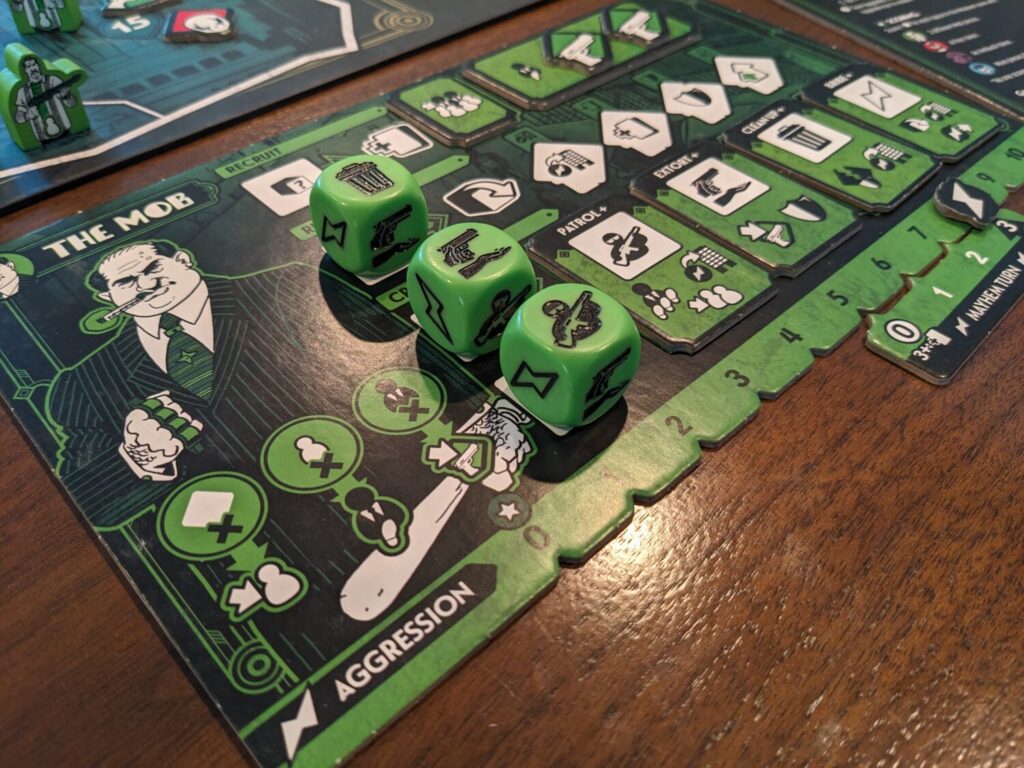
Scores in Grendel are low; the score track only reaches 25 spaces, and in our rounds, players were scoring 2-4 points per turn. At the end of the game, when the third borough scores, this also leads to a scoring of the two previous boroughs, but without an extra mayhem phase.
So, Grendel is fast, it’s tight, there’s a lot of jockeying for position in a borough that is about to score, and the game adds a nice strategic wrinkle to the scoring—any space with three or more factions in it actually doesn’t score any points. So, sometimes you will muck up the plans of an opponent by adding a third faction token to a space (of the four, although in a four-player game, areas with all four factions do not score).
In practice, this dynamism came with a cost: Grendel sometimes had what I call the “do/undo” problem. I played as the cops in this game, and I was surprised how often I would take two actions to add low-level cops all over the map, only to watch them get killed off by Argent or Grendel on their turns. Now, again, this was only one play, but I was surprised how often turns in Grendel played out something like this:
Cops: add two captains and six grunts to the map, add an influence token, arrest a suspect to take an opponent’s piece off the board.
Argent: play six cards, bust (so that they couldn’t play their bonus token), remove one of their six cards to then play five actions to move essentially from one borough to another, punch out three cop grunts (three of the six I just put on the map), move an Ambush token (for scoring influence) from one space to another.
Grendel: draw three chits, trigger a river of combos that include punching out mobsters and cops, place a Fear token (for scoring influence), move through their own network of Fear tokens to punch another goon, then drop another Fear token.
Sometimes, players would drop a token or meeple on the board, only to have that same component removed by the next player on their turn. I was surprised how often I felt powerless, at least as the police, by dropping tokens knowing full well they would not be on the map by the time my turn came around again.
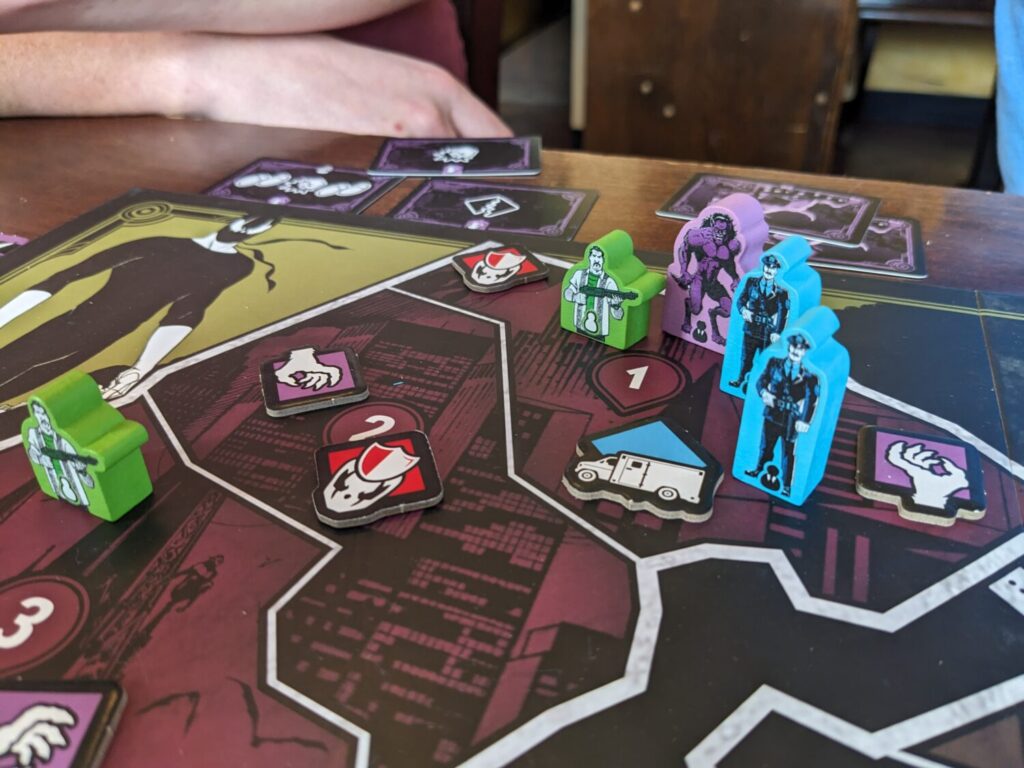
Click the Undo Button
Games that feature these kinds of levers—one person builds up a lot of infrastructure, only to watch it burn on the next turn—are certainly out there, but clearly I don’t enjoy them. You want to have some faith that the work you are putting in will pay dividends for even a turn or two, but we didn’t see that in our play. It’s not a lot of work to get more tokens or grunts out onto the board, but I would have enjoyed seeing them survive for more than 60 seconds.
That’s not the case here. So, then, how about the minigames….how do they feel?
“Argent feels really broken,” said, well, all three of us, especially the player who was privileged to operate as Argent during our play. At one point, because of an upgrade and a market of better cards Argent can add to his press-your-luck deck, the Argent player was using a continuous loop using a nine-card deck by the end of the game. He had upgraded a few cards, and was no longer drawing enough cards that might trigger a bust (some of Argent’s cards have a skull at the bottom, and when a fourth skull is drawn, the player must remove one of the previously-played cards before taking their turn).
It just felt like Argent was everywhere, and maybe that’s the intention. (After this play, I went back and re-read the rules for Argent a couple more times to make sure we had it right. We did.) Argent’s capacity to bust doesn’t come with any teeth—at least in the current ruleset—so the Argent player did what I would do: he played cards until he drew a fourth skull, then used his free discard action to get rid of the card that would have busted him, then he kept drawing until he busted again.
Sure, that might mean one less aggression drop in a tower, but some of the cards grant Argent that ability anyway. At no point was luck a part of the “press your luck” mechanic, if that makes sense. Argent is either going to have a great turn or a ridiculously-great one!
Even though Argent felt a bit too superpowered, all four factions had their moments during our play, and the fact that the cops get more points to spend on playing cards during the mayhem phase is not lost on me. Grendel has easy ways to be in other parts of the board quickly, so Grendel has a nice formula for getting tiles out on the board quickly. On the night before my first play, I did a walkthrough doing a two-player game featuring Grendel going against the Mob, and I like how the Mob’s upgrades come into play so quickly.
But there are some real challenges here that none of us really loved.
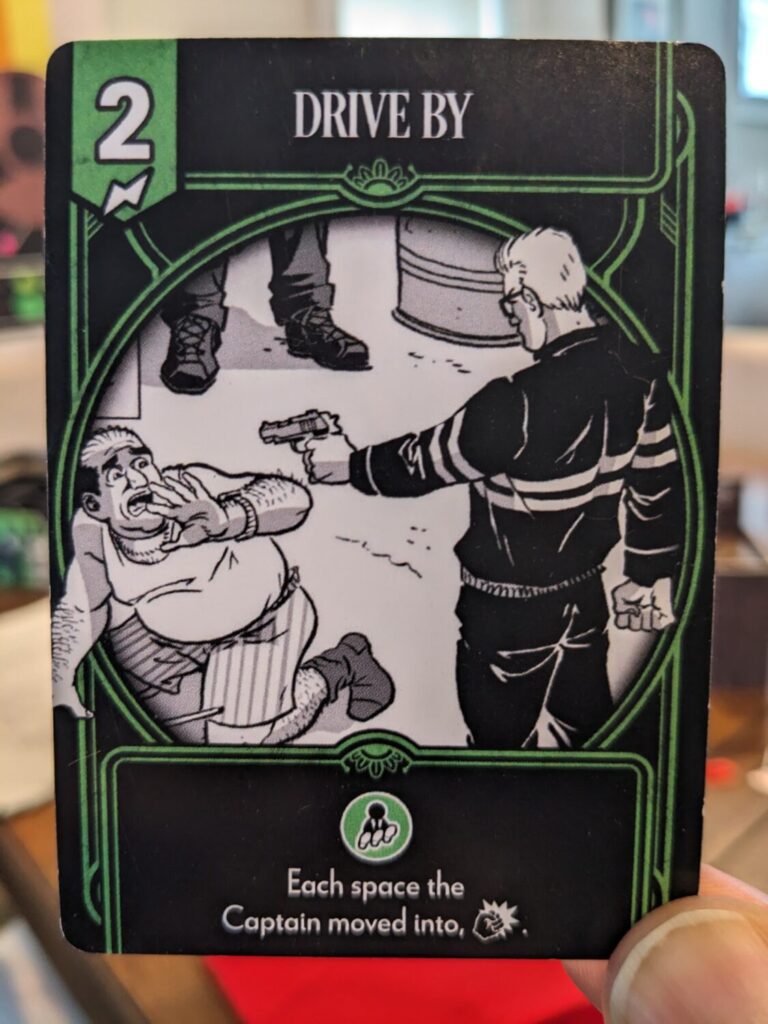
During the mayhem phase, players can usually only spend three aggression points, no matter how many tokens were dropped into a tower. The player who goes last in a mayhem phase, though, can spend any amount of aggression gained when it was placed in the tower.
I can’t tell what this is meant to reward; because they are the last player to score in a mayhem phase, they should be able to potentially play more cards, fight more goons, and possibly score more points? Is anyone intentionally trying to go last in a mayhem phase? Isn’t the idea that I am dropping tokens in that tower to trigger the scoring there as quickly as possible? What if I do that, but still go last in a round…should I be rewarded for that?
The game is called Grendel: The Game of Crime and Mayhem, but, strangely, you can play it without having a player join as Grendel. Is it weird that a game of Grendel might not actually feature, well, Grendel? No matter what, it’s an area control game, and you usually want to play these at their maximum player count.
That meant even a three-player game of Grendel featured a dummy faction—in my single play, this was the Mob—with grunts that stand around, waiting to be murdered by the human players. And since the meeple Mobsters weren’t coming back (there are no game effects that spawn out-of-play factions back onto the map), it was easy to see why so many people used their carcasses to get punch bonuses for taking those components out.
My guess is that Grendel shines the brightest at its maximum player count. Just having pieces standing around without a human owner, similar to 4X games that have unplayable faction pieces waiting to die to grant other players a small bonus, leaves a lot to be desired.
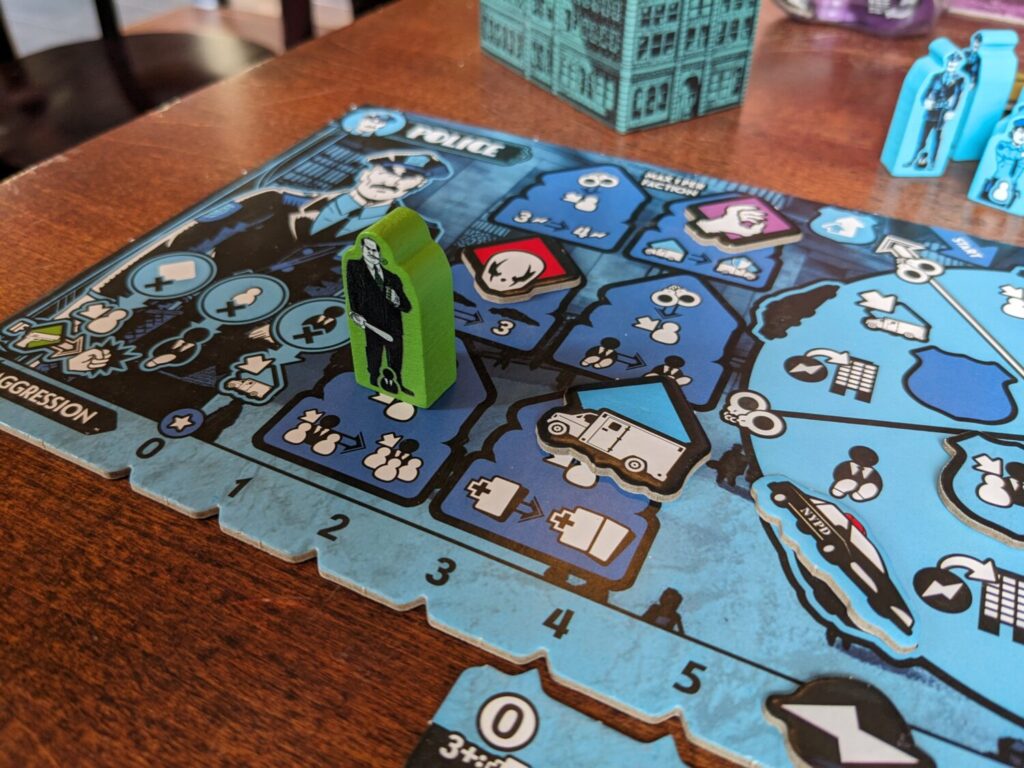
Does it Do Enough to Win?
I posed it to the other two players. Would you buy Grendel: The Game of Crime and Mayhem based on this single play?
Both said no, although that certainly has nothing to do with the production. We all agreed that even in prototype form, Grendel is a looker—the art on the cards, drawn by Wagner and other illustrators, is great, and I enjoyed the board presence along with the clear lines that delineate the important aspects regarding area control. The player aids were all we needed to get moving. I had printouts of each character’s section from the rulebook to give to each player, and after a couple turns, we didn’t really need them. The iconography is a little bumpy, but by the game’s halfway point, we had that down, too.
But in terms of the gameplay, all of us were let down. The loop already feels “samey”: build up influence tokens and troop forces, then watch the next player undo your work. The player that is best able to navigate along the edges is probably going to win. That push-and-pull, along with the way mayhem/area majority scoring phases worked, was already a bit dry even in a game that only took us about 75 minutes to play. (To be fair, this is another win—we got through it in roughly 20-25 minutes per player, less than the indication on the box of 30 minutes per player.)
While Argent’s upgraded deck cards had different powers, mainly in the form of skull elimination to ensure it was harder to bust, the cops and Grendel have upgrades that are simply “take this action, but also get one more icon of a thing you had access to earlier.” The police faction’s main upgrades are tied to getting low-level cops on the board faster and spending additional aggression points during the mayhem phase, but that only triggers if specific spaces on the cop’s player mat are filled with an opponent’s piece.
Grendel doesn’t do anything wrong, but its push for asymmetric play didn’t stretch to the heights of other recent games that featured similar mechanics, certainly not all-timers like some of the ones mentioned earlier in this article. (Heck, even the asymmetric play of a previous play by this very publisher, Harrow County, was much stronger than what I saw during my play of Grendel.)
I am very curious to see where the rules land when Grendel comes to retail. Until then, it is very difficult to assess the faction balance after just a single play. I know this much: I’ll be playing as Argent during my next go!


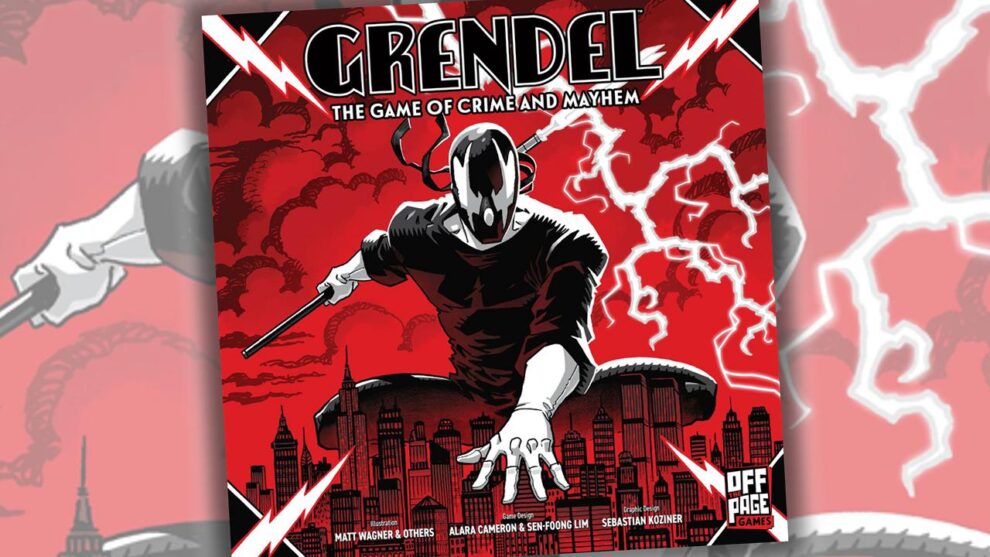
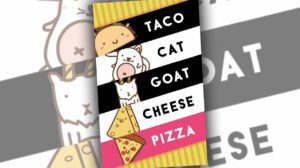
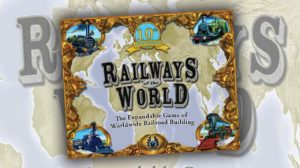






Add Comment